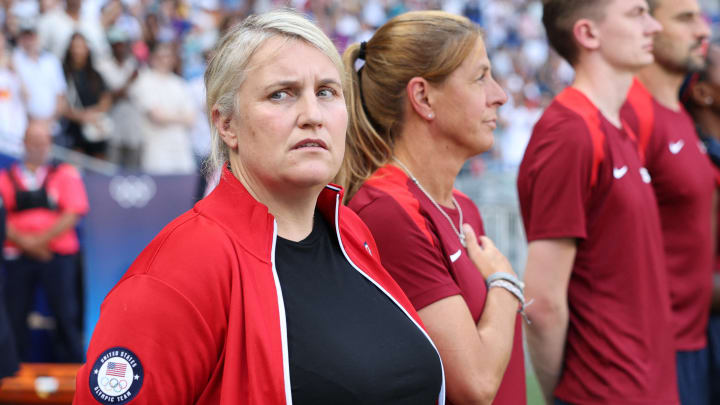Emma Hayes’s Gritty USWNT Is on the Precipice of a Gold Medal

After 121 arduous minutes of play, the U.S. women’s national team secured its spot in the Olympic final in Paris. Emma Hayes’s group willed itself to a 1–0 victory over Germany on Tuesday, advancing to a gold medal match for the first time since the 2012 London Games. The U.S. coach beamed as the final whistle blew, throwing her fists in the air, Hayes’s tenure now off to a booming start.
It was tense inside Stade de Lyon for the majority of the semifinal with the temperature hovering around 90 degrees—the humidity and pressure only mounting as the match entered into extra time. Despite the deadlock and fatigue, there was a sense the USWNT had the belief to pull out the win. Just as impressive as the final result was the conviction the team played with, which has emerged as a defining characteristic of the three-month-old Hayes era. The young squad operates with a certain level of inevitability, even in its first major tournament under its new manager.
Fighting heavy legs in its fifth game in less than two weeks, the U.S.’s front three once again summoned an act of brilliance in the 95th minute. Checking back to receive the ball in midfield, Mallory Swanson played a perfectly placed ball into the box for Sophia Smith, who one-timed her shot past a German keeper well off her line.
SOPHIA SMITH STRIKES IN EXTRA TIME FOR THE USA. 💥🇺🇸#ParisOlympics | 📺 USA Network and Peacock pic.twitter.com/XyzQZQTEEG
— NBC Olympics & Paralympics (@NBCOlympics) August 6, 2024
Add Tuesday’s go-ahead goal to the Olympic tally for the U.S. forward trio of Trinity Rodman, Swanson and Smith, who have been responsible for nine of the squad’s 11 goals at the 2024 Games. The trident—as some have lovingly referred to Rodman, Swanson and Smith—have also started every match in France, cultivating chemistry on the fly, while playing with an impressive shared intuition and fluidity. Hayes’s substitution patterns, or lack thereof, may have come under scrutiny during a punishing Olympic tournament schedule, but the U.S. attack is operating with a palpable alchemy that only comes with time.
“You have to build connections,” said Hayes at the outset of the 2024 Olympics. “You can’t just keep changing players all of the time. My philosophy is that the very best teams learn to play together first.”
If the match came down to two major moments, one being Smith’s finish, the other was Alyssa Naeher’s last-minute save. Blocking a close-range header, the goalkeeper opened up like a starfish, jumping in the air to deny the shot with her leg. It came down to inches, as soccer games often do. Winning takes a bit of luck in a close match like this semifinal, but when the players are bought in and a team is riding momentum, these defining moments tend to swing your way as they did for the USWNT on Tuesday in Lyon.
ICON.#WeAre | @AlyssaNaeher pic.twitter.com/MvmXRL4SyA
— Penn State Women’s Soccer (@PennStateWSOC) August 6, 2024
Naeher’s phenomenal save also padded another kind of tally: the back line’s impressive stockpile of clean sheets. The defense has conceded only two goals through the Olympics, a feat made possible by an in-sync back line anchored by Naomi Girma. The 24-year-old was handed the captain’s armband as Lindsey Horan exited the game in extra time, a nod to her impact on the team.
Patience, fluidity and flexibility have all come to bear as early Hayes-isms. There’s an argument to be made, however, that Girma is just as foundational to this U.S. generation as any philosophy or tactical approach. The center back has been nothing short of flawless through the USWNT’s five games in France, cleaning up chances in the box, tracking down dangerous runs, executing quality distributions and dictating the team’s tempo.
“She’s the best defender I’ve ever seen. Ever,” Hayes said after the Germany match. “I've never seen a player as good as her in the back."
With a new mentality and the talent to match, Hayes has begun to carve out what this next epoch of the USWNT will look like. There were few expectations of this squad heading into the Olympics, but in short order, Hayes has lifted the U.S. back to favorite status, now on the precipice of an Olympic gold medal.
“I think this team is firmly focused on creating a new history together,” Hayes said.
This new generation of the USWNT has shown it is energetic, brash and brimming with potential. But now, with Hayes at the helm, this group has the opportunity to do something legacy-defining; something the U.S. hasn’t done since the 2019 World Cup: win a major tournament.

Clare Brennan is an associate editor for Sports Illustrated focused on women’s sports. Before joining SI in October 2022, she worked as an associate editor at Just Women’s Sports and as an associate producer for WDET in Detroit. Brennan has a bachelor's in international studies from the University of Wisconsin and a master's in art history from Wayne State University.
Follow clare_brennan2